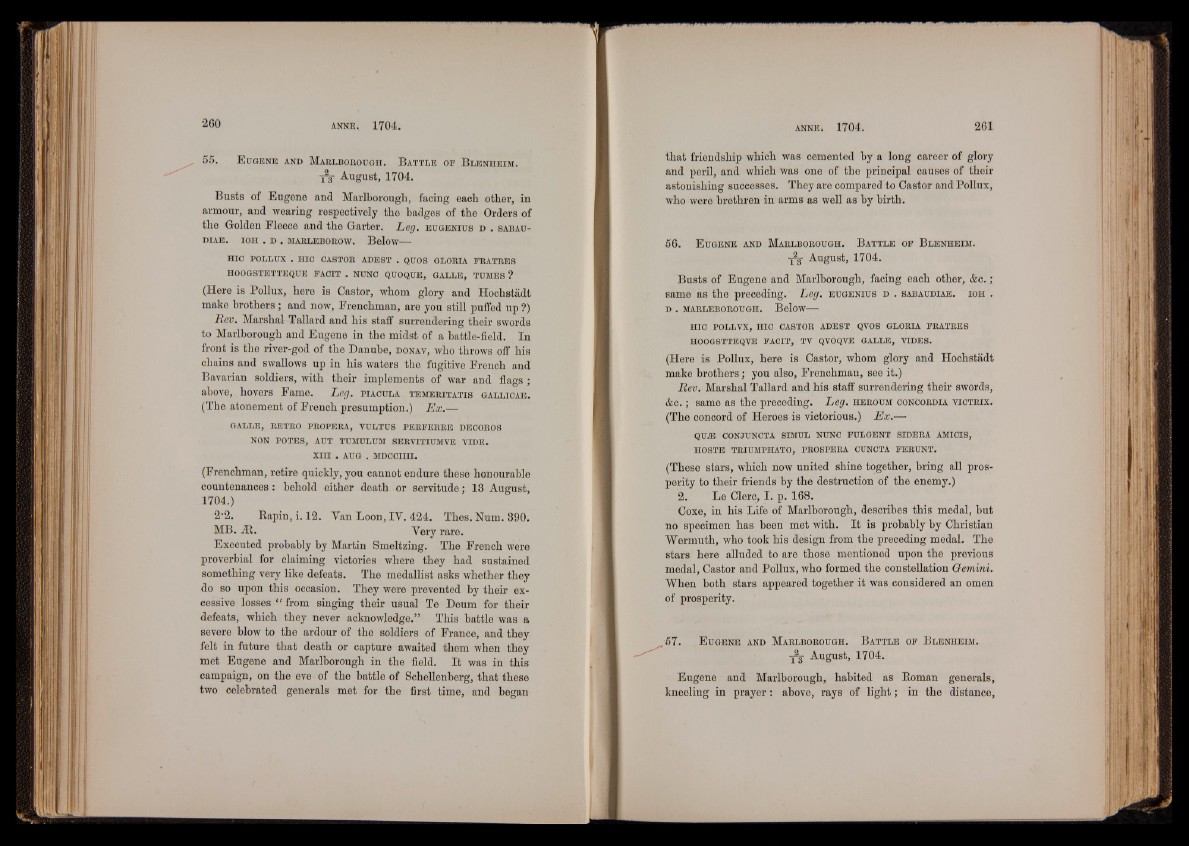
6 5 . E u g e n e and M a r l b o b o u g h . B a t t l e o f B l e n h e im .
Yg August, 1704.
Busts of Eugene and Marlborough, facing each other, in
armour, and wearing respectively the badges of the Orders of
the Golden Fleece and the Garter. Leg. e u g e n iu s d . sabau-
DIAE. IOH . D . MAELEBOBOW. Below---
HIO POLLUX . HIO CASTOR ADEST . QUOS GLORIA FRATRES
HOOGSTETTEQUE FAOIT . NUNO QUOQUE, GALLE, TUMES ?
(Here is Pollux, here is Castor, whom glory and Hochstadt
make brothers; and now, Frenchman, are you still puffed up ?)
Rev. Marshal Tallard and his staff surrendering their swords
to Marlborough and Eugene in the midst of a battle-field. In
front is the river-god of the Danube, donav, who throws off his
chains and swallows up in his waters the fugitive French and
Bavarian soldiers, with their implements of war and flags ;
above, hovers Fame. Leg. p ia c u l a t e m e b it a t is g a l l io a e .
(The atonement of French presumption.) E x .—
GALLE, BETBO PROPERA, VULTUS PERFERRE DEOOEOS
NON POTES, AUT TUMULUM SERVITIUMVE VIDE.
XIII . AUG . MDOOIHI.
(Frenchman, retire quickly, you cannot endure these honourable
countenances: behold either death or servitude; 18 August,
1704.)
2'2. Bapin, i. 12. Yan Loon, IV. 424. Thes. Num. 890.
MB. At. Very rare.
Executed probably by Martin Smeltzing. The French were
proverbial for claiming victories where they had sustained
something very like defeats. The medallist asks whether they
do so upon this occasion. They were prevented by their excessive
losses “ from singing their usual Te Deum for their
defeats, which they never acknowledge.” This battle was a
severe blow to the ardour of the soldiers of France, and they
felt in future that death or capture awaited them when they
met Eugene and Marlborough in the field. It was in this
campaign, on the eve of the battle of Schellenberg, that these
two celebrated generals met for the first time, and began
that friendship which was cemented by a long career of glory
and peril, and which was one of the principal causes of their
astonishing successes. They are compared to Castor and Pollux,
who were brethren in arms as well as by birth.
56. E u g e n e and M a r l b o r o u g h . B a t t l e o f B l e n h e im .
August, 1704.
Busts of Eugene and Marlborough, facing each other, &c.;
same as the preceding. Leg. e u g e n iu s d . sa b a u d ia e . io h .
d . m a r l e b o r o u g h . Below—
HIO POLLVX, HIO CASTOR ADEST QVOS GLORIA FRATRES
HOOGSTTEQVE FAOIT, TV QVOQVE GALLE, VIDES.
(Here is Pollux, here is Castor, whom glory and Hochstadt
make brothers; you also, Frenchman, see it.)
Rev. Marshal Tallard and his staff surrendering their swords,
&c.; same as the preceding. Leg. h e r o u m concordia v io t r ix .
(The concord of Heroes is victorious.) E x .—
QUiE CONJUNOTA SIMUL NUNO FULGENT SIDERA AMICIS,
HOSTE TRIUMPHATO, PROSPERA OUNOTA FERUNT.
(These stars, which now united shine together, bring all prosperity
to their friends by the destruction of the enemy.)
2. Le Clerc, I. p. 168.
Coxe, in his Life of Marlborough, describes this medal, but
no specimen has been met with. It is probably by Christian
Wermuth, who took his design from the preceding medal. The
stars here alluded to are those mentioned upon the previous
medal, Castor and Pollux, who formed the constellation Gemini.
When both stars appeared together it was considered an omen
of prosperity.
,57. E u g e n e a nd M a r l b o r o u g h . B a t t l e o f B l e n h e im .
Yg August, 1704.
Eugene and Marlborough, habited as Boman generals,
kneeling in prayer: above, rays of ligh t; in the distance,